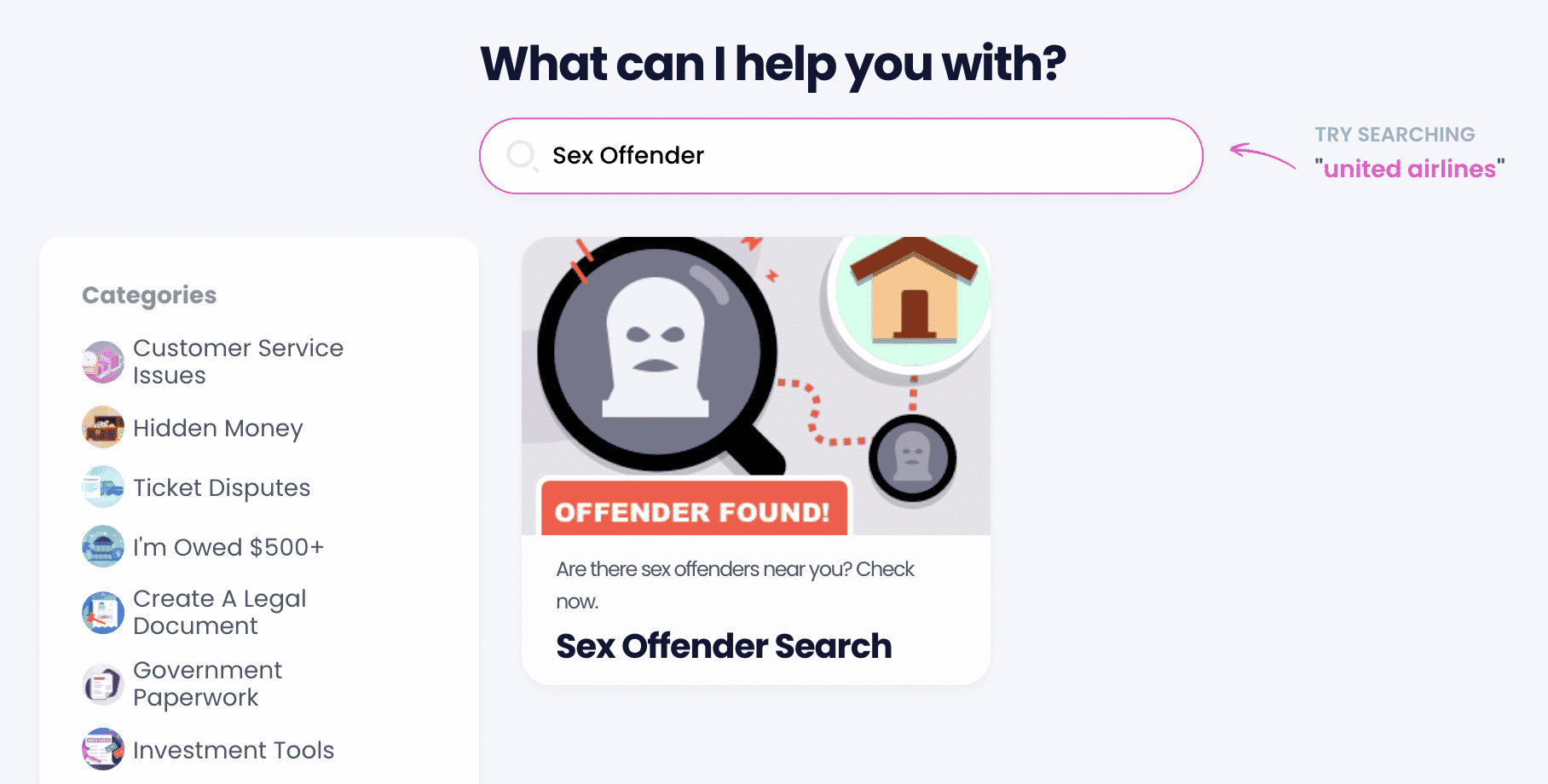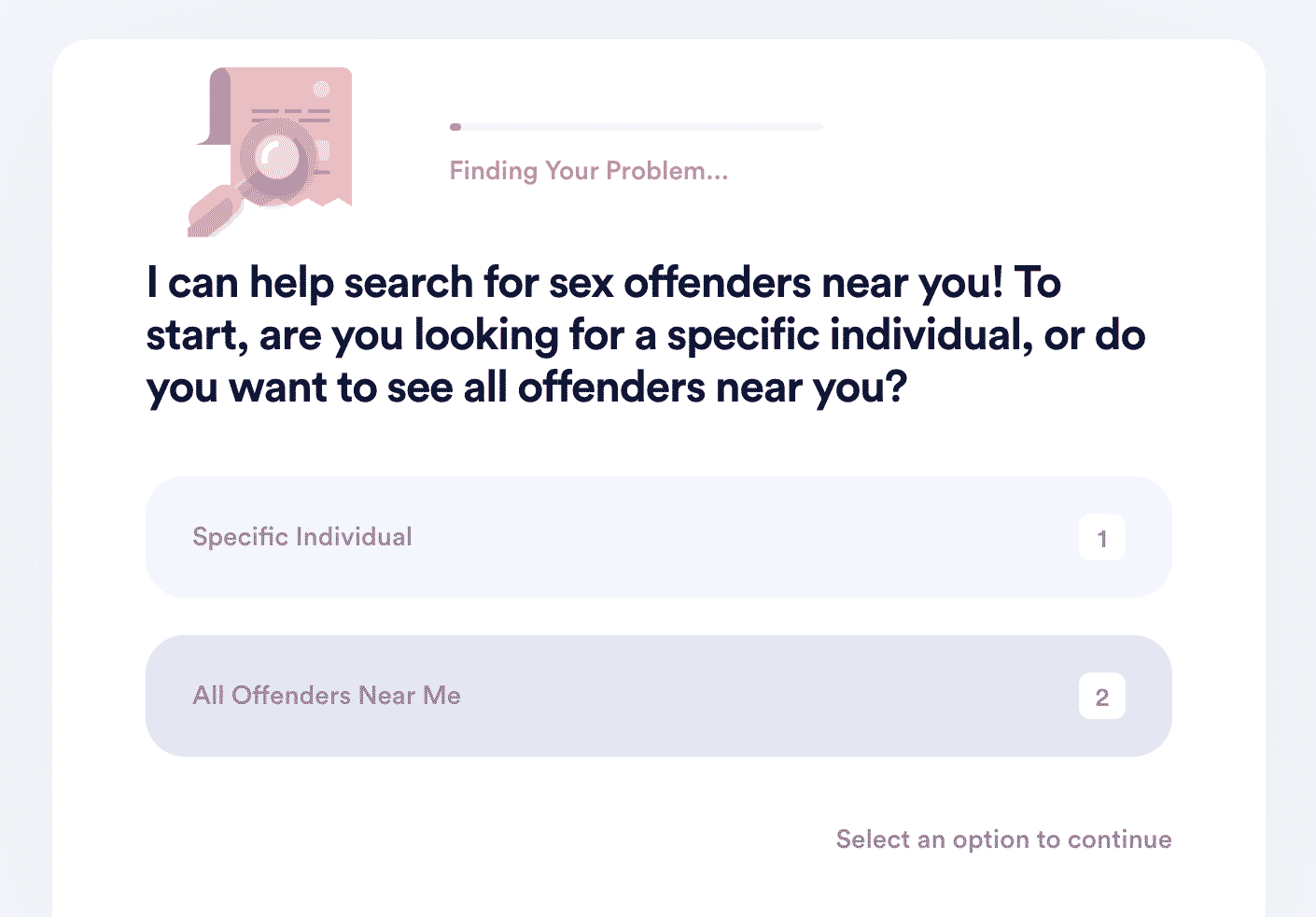How Far Does a Sex Offender Have To Live From a School? DoNotPay Helps You Find Out!
A school can be a thriving hunting ground for sex offenders preying on vulnerable children and minors. Repeated incidents of registered sex offenders getting caught on school campuses only aggravate your anxiety.
How far does a sex offender have to live from a school? DoNotPay’s educational guides on sex offender laws can help you stay informed.
We can also help you scan any area for registered sex offenders in under a minute. to get comprehensive reports and automated alerts on sex offenders living near any school!

Why It’s Essential To Keep Sex Offenders Away From School
Child sex offenders are more prone to recidivism—i.e., committing the same crime multiple times. A 2017 study on child sexual abuse found that:
- 70% of child sex offenders have between one and nine victims
- 20% of child sex offenders have 10–40 victims
- 90% of victims were abused by someone they knew
- 70% of child sexual abuse cases took place in the residence of the perpetrator or the victim
The upsetting figures above suggest that most child sexual offenders familiarize themselves with their victims before molesting them. Menacing sex offenders loiter around schools to single out gullible kids away from the supervision of their parents. The bustling school premises only makes it easier for predators to hide in plain sight.
How Far Does a Registered Sex Offender Have To Live From a School?
Megan’s Law may have made it mandatory for all U.S. states to open their sex offender registries to the public, but the residential restrictions are still decided by each state. All of them have sexual offender registration laws that may or may not ban a child sex offender from living near a school.
Here are some common residential restrictions employed by states to make schools a predator-free zone:
- Most states either forbid all or only their high-tier-risk sex offenders from residing anywhere between 500 and 2,640 feet of any school, daycare facility, park, or any other place where minors congregate
- Some states also prohibit such sex offenders from loitering around such facilities or public spots frequented by minors
- An offender may be asked to move or produce proof of residency—depending on the laws of a particular state—if they already have a permanent place of residence in a predator-free area
What About Sex Offenders Working Near Schools?
The residency restrictions would fail to serve their purpose if sex offenders were allowed access to school areas in the name of employment. In the past, as many as 15 sex offenders—some with a history of abusing children—managed to find jobs at U.S. schools.
At present, there are no uniform laws in the U.S. that disallow sex offenders from working near schools. Some states have placed the following laws to maintain the integrity of schools:
- Sex offenders cannot find employment at schools, childcare centers, or any other place where they can come in regular contact with children
- Sex offenders cannot seek jobs within a specified radius of a school
Are Juvenile Sex Offenders Allowed in Schools?
While the laws can be strict for adult sex offenders, the reality seems controversial with respect to juvenile sex offenders who are still allowed to attend schools.
Many states allow juveniles not to register themselves as sex offenders, which also lets them travel freely without any restrictions. Some juvenile offenders may be mapped and tracked by law enforcement depending on the severity of their offense.
Consequences of Restrictions—Where Can a Sex Offender Live?
Sex offenders who are subject to residential restrictions may find it hard to find a place to live. You can browse through this table to understand the implications of such restrictions:
| Issue | Details |
| Housing complications |
|
| Homelessness | Many offenders are forced into homelessness due to residency restrictions. This makes it harder for law enforcement to monitor the offenders. The instability may push homeless offenders towards more crimes or cause mental illnesses |
| Retreat to rural areas |
|
DoNotPay Can Help You Secure the Perimeter Around Any School
You can never be too careful when it comes to the safety of kids, especially with slimy child predators on the prowl. The government sex offender registry websites allow you to access their database to keep tabs on registered offenders, but the slow and frustrating search process can wreak havoc in your life.

DoNotPay offers you an efficient and stress-free alternative to keep an eye on the sex offenders roaming around schools. Follow these easy steps to safeguard your little ones:
- and click on our Sex Offender Search feature
- Tell us what you’re looking for—details on a particular sex offender or an extensive list of all the sex offenders near an address
- Specify the radius for our AI-based search—one, two, or three miles
- Select the optional weekly scan feature
DoNotPay will gather your search parameters and access the respective state registry to generate your customized report. You can browse the report for all the latest info and pictures on the registered sex offenders within the search radius.
Safety and Stability Go Hand-in-Hand With DoNotPay
Consistent monitoring plays a key role in keeping your children safe. With DoNotPay, you don’t have to waste time with tedious safety scans every other day.
If you choose our routine scan option, our app will run a perimeter search for your given address every week. We will drop an automated alert at the end of each scan to make sure you stay informed at all times.
Check out this table if you want to know more about the sex offender laws in any state:
To Send Demand Letters To or Not To Send Demand Letters To?
Hiring a lawyer to help you send demand letters to a company can be helpful, but it can also cost you an arm and a leg. Luckily, you can avoid wasting hundreds of dollars and use our AI Consumer Champion to send demand letters to any company in small claims court instead!
DoNotPay offers you a variety of other features you will find quite useful when dealing with bureaucratic issues. Check out the list below to see what else our app can help you with:
- Creating
- Fighting workplace discrimination
- Applying for a college fee waiver
- Finding an online notary
- Lowering property taxes
- Filing for crime victim compensation
- Creating a child travel consent form
Shopping Without Dropping
Whoever said you should shop until you drop didn’t have access to DoNotPay’s various features. With our app, you can make your shopping experience smooth sailing and stress-free!
Here’s a fragment of what you can accomplish by using our neat features:
- Reach customer support in a snap
- Get a refund easily
- File a missing or damaged parcel claim
- Request an item return
- Get cash back from your used gift cards
- Cancel any subscription with ease
- Sign up for free trials
- Claim warranties